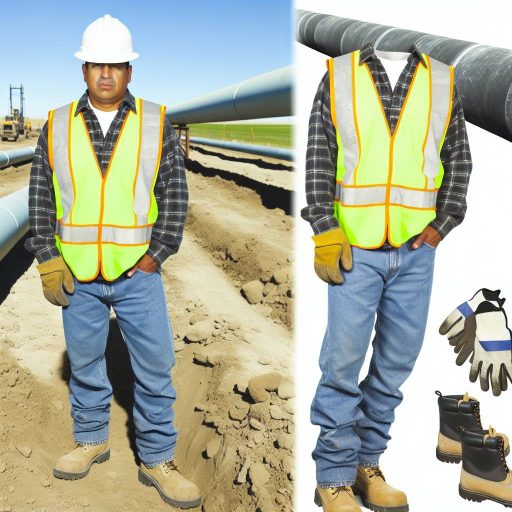Introduction:
Insulation workers play a critical role in the construction industry by ensuring buildings are energy-efficient and comfortable.
With the increasing emphasis on sustainable practices, the demand for skilled insulation workers is on the rise.
This blog post aims to explore various training programs available for aspiring insulation workers.
Importance of Insulation Workers:
Insulation workers are essential in enhancing the energy efficiency of buildings by installing various types of insulation materials.
They help to regulate temperatures, reduce energy consumption, and increase overall comfort in residential and commercial spaces.
Growing Demand for Skilled Insulation Workers:
As sustainability becomes a key focus in the construction industry, the demand for qualified insulation workers continues to grow.
With stricter building codes and environmental regulations, the need for professionals who can effectively install and maintain insulation systems is higher than ever.
Exploring Training Programs:
There are several training programs designed to equip aspiring insulation workers with the necessary skills and knowledge to succeed in the field.
These programs cover a wide range of topics, including different insulation materials, installation techniques, safety procedures, and building codes.
By undergoing specialized training, individuals can learn how to select the right insulation materials for specific projects.
They can also properly install them to maximize their effectiveness and ensure compliance with industry standards.
Additionally, training programs often include hands-on experience and apprenticeship opportunities to help participants apply their knowledge in real-world scenarios.
With the right training and qualifications, aspiring insulation workers can embark on a fulfilling career in a growing industry that prioritizes energy efficiency and sustainability.
Overview of Insulation Worker Responsibilities:
Insulation workers play a crucial role in construction projects by ensuring that buildings are properly insulated.
They are responsible for installing materials that help regulate temperature, prevent energy loss, and improve overall comfort.
- Define the role of insulation workers in construction projects:
- Insulation workers are tasked with installing and applying various types of insulation materials in buildings, including fiberglass, foam, and cellulose.
- Explain the importance of proper insulation in buildings:
- Proper insulation is essential for maintaining energy efficiency and reducing heating and cooling costs.
- It also helps to create a comfortable and healthy indoor environment by regulating temperature and humidity levels.
- Highlight the skills and knowledge required for the job:
- Insulation workers need to have a good understanding of building codes, safety regulations, and proper installation techniques.
- They must also have physical strength and dexterity to work with heavy materials and in tight spaces.
Overall, insulation workers play a vital role in ensuring that buildings are energy-efficient, comfortable, and compliant with regulations.
Their skills and knowledge are essential for the success of construction projects and the satisfaction of building occupants.
Importance of Training Programs:
Formal training is essential for aspiring insulation workers to ensure safety on the job.
Completing a training program provides hands-on experience and knowledge of industry standards.
Training can lead to better job opportunities by demonstrating a commitment to professional development.
Transform Your Career Today
Unlock a personalized career strategy that drives real results. Get tailored advice and a roadmap designed just for you.
Start NowInsulation workers with formal training typically earn higher pay due to their specialized skills.
Benefits of Training Programs:
Training programs teach aspiring insulation workers proper techniques for installing and repairing insulation.
Knowledge gained through training helps workers understand different types of insulation materials and their uses.
Hands-on training allows workers to practice using tools and equipment safely and effectively.
Completing a training program can lead to certification, which enhances credibility and professionalism.
Training for Better Job Opportunities and Higher Pay:
Employers often prefer hiring insulation workers with formal training and certification.
Training programs equip workers with the skills and knowledge needed to excel in the field.
Certified insulation workers are eligible for a wider range of job opportunities in various industries.
Higher pay is typically offered to certified insulation workers due to their specialized training and expertise.
Uncover the Details: Cost Breakdown: Professional vs. DIY Window Cleaning
Types of Training Programs Available:
Training programs vary in structure and duration.
- Traditional Apprenticeships:
- Long-standing method of training where apprentices work alongside experienced professionals.
- Hands-on approach allows for practical skill development and on-the-job learning.
- Typically takes several years to complete and requires a commitment to the trade.
Modern Vocational Training:
- Focused training programs that cover specific skills needed for insulation work.
- Shorter duration compared to apprenticeships, offering a quicker path to entering the field.
- Often includes classroom instruction combined with hands-on training in a simulated work environment.
Online Training Options:
- Virtual courses that can be completed remotely, allowing for flexibility in scheduling.
- Provides theoretical knowledge and some practical exercises through online platforms.
- Suitable for individuals looking to learn at their own pace without attending in-person classes.
In-Person Training:
- Traditional classroom settings where instructors teach theory and practical skills in person.
- Hands-on training opportunities to work with tools and materials under supervision.
- Interactive sessions that promote direct interaction with instructors and peers for collaborative learning.
By considering these various training options, aspiring insulation workers can choose the program that best fits their learning style and career goals.
Each type of training has its advantages and can lead to a successful career in the insulation industry.
Research and evaluate the different programs available to make an informed decision about the most suitable training path.
Acquiring the necessary skills and knowledge will help individuals excel in this specialized field.
Learn More: Green Building: Eco-Friendly Drywall Options
Showcase Your Business Today
Reach thousands of readers actively exploring professional services. Publish your business profile and grow your audience now.
Publish NowAccreditation and Certification:
Accreditation ensures that the training program meets specific quality standards set by accrediting bodies.
Certifications validate the skills and knowledge of insulation workers.
This increases their credibility and employability.
- The North American Insulation Manufacturers Association (NAIMA)
- The National Insulation Association (NIA)
- The Insulation Institute
- The Environmental Protection Agency (EPA)
Explore Further: Pest Control Work: Legal and Ethical Issues
Curriculum and Course Structure:
Insulation worker training programs typically cover a wide range of topics to prepare students for success in the field.
Students can expect to learn about different types of insulation materials, installation techniques, safety protocols, and more.
Practical hands-on training opportunities are a key component of many insulation worker training programs.
Students have the opportunity to apply what they have learned in a real-world setting under the guidance of experienced instructors.
This hands-on experience helps students develop the skills and confidence they need to succeed in their future careers.
In addition to general insulation training, some programs may offer specialized courses or certifications in specific areas.
For example, students may have the opportunity to learn about advanced insulation materials or techniques to further expand their skillset.
These specialized courses can help students stand out in the job market and pursue more advanced career opportunities.
Gain More Insights: Tips for Effective Communication with Clients

Job placement assistance is a key component of training programs for aspiring insulation workers.
These programs go beyond teaching technical skills and provide support to help students transition into the workforce successfully.
How Training Programs Help Students Find Employment
Training programs equip students with the necessary skills and knowledge to excel in the field of insulation work.
In addition to technical training, these programs also offer job placement assistance to help students secure employment opportunities after graduation.
One way in which training programs help students find employment is by connecting them with industry partners and employers.
These partnerships provide students with networking opportunities and access to job openings in the insulation industry.
Furthermore, training programs often have dedicated career services departments that offer support to students in their job search.
These services may include resume building, cover letter writing, interview preparation, and career counseling.
Career Services Provided by Training Institutions
Training institutions that offer programs for aspiring insulation workers typically have a range of career services available to students.
These services are designed to help students successfully transition from training to employment in the field.
One of the key career services provided by training institutions is resume building assistance.
Students receive guidance on how to create a professional resume that highlights their skills and experiences relevant to the insulation industry.
Additionally, training institutions offer interview preparation workshops to help students feel confident and prepared when meeting with potential employers.
These workshops cover commonly asked interview questions and provide tips for successful interviewing.
Another important career service offered by training institutions is job search assistance.
This may include access to job boards, networking events, and job fairs specifically tailored to the insulation industry.
Job Placement Rates for Graduates of These Programs
Training programs for aspiring insulation workers often have high job placement rates for graduates.
These rates are a testament to the quality of training and support provided by the programs.
Many training programs have partnerships with employers in the insulation industry, which makes it easier for graduates to find job opportunities.
These partnerships often result in direct job placements or internships for students.
Additionally, the job placement rates for graduates of training programs are a reflection of the demand for skilled insulation workers in the industry.
Employers are actively seeking qualified candidates who have completed training programs and are ready to enter the workforce.
Cost and Financial Aid Options:
– Enrolling in a training program for aspiring insulation workers can vary in cost.
– Costs may include tuition fees, materials, tools, and potentially certification exams.
– It’s essential to research different programs to find one that fits your budget.
– Some training programs may offer financial aid options to help offset costs.
– Financial aid options can include federal grants, loans, scholarships, and work-study programs.
Showcase Your Business Today
Reach thousands of readers actively exploring professional services. Publish your business profile and grow your audience now.
Publish Now– Federal aid programs such as Pell Grants can provide significant assistance to students.
– Scholarships may be available through industry associations or specific training programs.
– Grants are often awarded based on financial need and do not require repayment.
– Work-study programs allow students to work part-time while studying to help cover costs.
– It’s essential to explore all available options to minimize out-of-pocket expenses.
– Contact the training program directly to inquire about specific financial aid opportunities.
Summary:
Costs for training programs for aspiring insulation workers can vary, including tuition, materials, and certification fees.
However, financial aid options such as grants, scholarships, and work-study programs are available to help offset these costs.
Research different programs and reach out to them directly to explore all available assistance options.
Essential Training for Insulation Workers
Training programs for aspiring insulation workers are crucial for success in the industry.
By completing a formal training program, individuals can gain the necessary skills and knowledge to excel in their roles.
These programs offer a wide range of benefits, including hands-on experience, mentorship opportunities, and industry certifications.
Graduates of training programs are more likely to secure employment and advance in their careers.
If you are considering a career as an insulation worker, I highly encourage you to explore training programs in your area.
Investing in your education and skills development will set you apart from the competition.
This investment will pave the way for a successful career in the insulation industry.
Additional Resources
2022 Maine Clean Energy Workforce Analysis Report
Starting a Regenerative Farm From Scratch — Mastodon Valley Farm
[E-Books for Sale]
The Big Book of 500 High-Paying Jobs in America: Unlock Your Earning Potential
$19.99 • 500 High-Paying Jobs • 330 pages
Explore 500 high-paying jobs in America and learn how to boost your career, earn more, and achieve success!
See All 500 High-Paying Jobs of this E-Book
1001 Professions Without a Degree: High-Paying American Jobs You Can Start Now
$19.99 • 1001 Professions Without a Degree • 174 pages
Discover 1001 high-paying jobs without a degree! Unlock career tips, skills, and success strategies for just $19.99!




